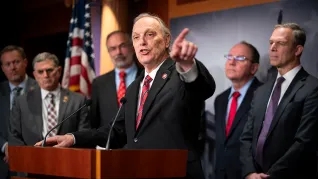
The House on Wednesday voted to dramatically expand Congress’s ability to roll back regulations passed by the prior administration, a move by the GOP to crush a number of new rules passed in the final year of the Biden administration.
The final vote was 212-208. Reps. Henry Cuellar (D-Texas) and Brian Fitzpatrick (R-Pa.) were the only lawmakers to vote with the opposite side of the aisle.
Congress already has the power under the Congressional Review Act (CRA) to do a case-by-case review of any regulation finalized since August, roughly the final six months of former President Biden’s term.
But under the legislation adopted Wednesday that power would extend to the final year of Biden’s term, while likewise allowing for a bill that would roll together a year of regulations, killing them in one fell swoop.
Dubbed the Midnight Rules Relief Act, the push by Republicans implies it would target rules and regulations done in the eleventh hour of the Biden administration.
But Rep. Jamie Raskin (D-Md.), the top Democrat on the House Judiciary Committee, noted that Republicans already have the power to disapprove of a suite of new regulations covering everything from protections against lead in drinking water to financial protections for consumers.
“All the regulations adopted in the final 365 days of the prior administration, an entire year. All the regulations adopted in the last year can be tied together in a bundle wrapped up together in a giant bunch and then voted down as the single jumbo resolution. This tactic could be used to try to get Congress to eliminate no fewer — by my count — than 355 major regulations from the last year of Joe Biden,” he said.
“Voting on completely different subjects at the same time is a moronic way to govern and an invitation to political manipulation of the will of the people.”
The CRA already gives Congress the power to review regulations, so long as they were finalized within the last 60 legislative days, in this case stretching back to mid-August.
The GOP bill would only extend that timeline for “the final year of a president’s term,” giving them greater power to unwind a predecessor’s policy.
The CRA already blocks regulatory agencies from writing a substantially similar rule, however, another point of alarm for Democrats.
House Democratic leadership urged its members to vote against the measure. In a notice sent to members, House Minority Whip Katherine Clark (D-Mass.) said if the legislation if adopted, “it would afford the Republican-controlled Congress and White House the ability to quickly undo wide swaths of agency rules while simultaneously preventing these agencies from issuing substantially similar rules ever again.”
“At the very least, they should be accountable each time they attempt to undo policies that protect Americans from scams, pollution, and corporate greed,” she added.
Republicans, meanwhile, framed the move as a way for Congress to retake the power over policy given in the Constitution.
“In reality they would rather have nameless, faceless, unelected bureaucrats govern this country. That’s what they want. … If you want to preserve the separation of powers, it may be gone but we could reinstitute it,” said Rep. Andy Biggs (R-Ariz.), one of the bill’s sponsors.
Rep. Kevin Kiley (R-Calif.) said Congress had to push back against executive branch overreach.
“I’d point out that there was no debate at all in this chamber for any of those regulations when they were imposed by the agencies. We had no role whatsoever. And so this act allows us to reclaim our legislative authority and our role in the policymaking process going forward,” he said.
Raskin, however, said Republicans were the ones overreaching by targeting such a lengthy period of regulatory work, saying Republicans weren’t just targeting so-called midnight rules but “twilight, midday and early-morning regulations.”
At stake if approved are a number of regulations finalized in the last year of the Biden administration.
One dealing with merit-based protections for workers was an effort by Biden to blunt a future effort from President Trump to reimpose Schedule F, an effort to make civil servants easier to hire and fire, akin to political appointees.
Under the Biden regulation, current civil service workers could only have their current workplace status — and protections against swift removals — switched with their consent. If that regulation is toppled by Congress, it would be easier to slot employees into the new status created by Trump, known under a new executive order as Schedule P/C.
And according to a list of potential CRA targets compiled by Public Citizen, a left-leaning group, other impacted regulations could include anti-money laundering regulations, limitations on selling cigarettes to anyone under 21, restriction on methane production in the oil and gas industry and more.
Wednesday’s vote marks the second time in as many months that House Republicans passed the legislation. The chamber cleared the measure in a largely party-line 210-201 vote in December, with Cuellar and Fitzpatrick crossing the aisle last year as well.
The measure never advanced in the Senate, given that it was controlled by Democrats and the fact that the House sent it over just days before the chamber broke for Christmas recess, ending the 118th Congress.
Biggs, the lead sponsor of the legislation, reintroduced the bill on Jan. 13, a week before President Trump’s inauguration, arguing that it would give Congress an ability to “clear the deck of America Last rules and regulations imposed by the Biden-Harris regime.”